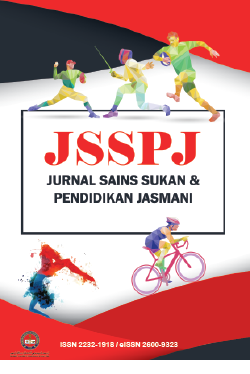The effect of using TGfU approach in teaching basketball during the physical education lesson on positive behavior among primary school students
DOI:
https://doi.org/10.37134/jsspj.vol12.2.1.2023Keywords:
Teaching Games for Understanding (TGfU), Positive behaviour, Primary school children, Physical education, Problem-solvingAbstract
The aim of this study is to investigate the impact of teaching basketball using the Teaching Games for Understanding (TGfU) method on positive behaviour in primary school children during physical education classes. The study aimed to assess whether the use of the TGfU approach resulted positive behaviour, understanding the rules and strategies and enjoyment. The TGfU method focuses on developing problem-solving and decision-making skills through sports and gameplay. A sample of primary school students who were taught basketball using the TGfU method and a control group of students who were taught using the traditional method participated in the study. The findings of the study were compared to another group of students who were also taught basketball using the traditional method. A standardized rating scale is used to assess the children's behaviour, and the results showed that the students who participated in classes taught with the TGfU method demonstrated significantly higher levels of positive behaviour compared to both the control group and the students who were taught with the traditional method. These findings add weight to the idea that the TGfU method is a viable alternative for promoting positive behaviour in physical education classrooms. It is suggested that further research be conducted to gain a better understanding of the long-term effects of the TGfU approach on student behaviour and to identify the most effective ways to use this strategy in physical education settings. Additionally, research should be performed to determine the most effective ways to implement this approach in competitive sports. Possible future research topics could include the use of the TGfU method in coaching various sports and physically active activities.
Downloads
References
Clarke, E. (2021). Contemporary Approaches to Behaviour and Mental Health in the Classroom: Weaving Together Theory, Practice, Policy and Educational Discourse (1st ed.). Routledge. https://doi.org/10.4324/9781003035527
Dyson, B., Howley, D., & Wright, P. M. (2021). A scoping review critically examining research connecting social and emotional learning with three model-based practices in physical education: Have we been doing this all along? European Physical Education Review, 27(1), 76-95. https://doi.org/10.1177/1356336X20923710
García-Castejón, G., Camerino, O., Castañer, M., Manzano-Sánchez, D., Jiménez-Parra, J. F., & Valero-Valenzuela, A. (2021). Implementation of a hybrid educational program between the model of personal and social responsibility (TPSR) and the teaching games for understanding (TGfU) in physical education and its effects on health: an approach based on mixed methods. Children, 8(7), 573. https://doi.org/10.3390/children8070573
Jiang, Z. (2022). The teaching of sports physical education skills under exercise physiology based on support vector machine. Discrete Dynamics in Nature and Society, 2022. https://doi.org/10.1155/2022/4416617
Li, X., Lee, C. Y., Chen, S. H., Gao, M., Hsueh, S. C., & Chiang, Y. C. (2022). The role of collective integration and parental involvement on adolescent anxiety—A multilevel analysis. Journal of Affective Disorders, 317, 37-45. https://doi.org/10.1016/j.jad.2022.08.053
Merrell, K. W. (1993). Using behavior rating scales to assess social skills and antisocial behavior in school settings: Development of the school social behavior scales. School Psychology Review, 22(1), 115-133. https://doi.org/10.1080/02796015.1993.12085641
Sallis, H., Szekely, E., Neumann, A., Jolicoeur‐Martineau, A., Van IJzendoorn, M., Hillegers, M., ... & Evans, J. (2019). General psychopathology, internalising and externalising in children and functional outcomes in late adolescence. Journal of Child Psychology and Psychiatry, 60(11), 1183- 1190. https://doi.org/10.1111/jcpp.13067
Siebert, F. W., Albers, D., Naing, U. A., Perego, P., & Santikarn, C. (2019). Patterns of motorcycle helmet use–A naturalistic observation study in Myanmar. Accident Analysis & Prevention, 124, 146-150. https://doi.org/10.1016/j.aap.2019.01.011
Turan, G. Y., Köklükaya, A. N., & Yıldırım, E. G. (2020). Improving matter and heat subjects learning through genuine designed educational games. International Journal of Science and Mathematics Education, 18(1), 19-42. https://doi.org/10.1007/s10763-018-09945-0
Vahabzadeh, A., Keshav, N. U., Abdus-Sabur, R., Huey, K., Liu, R., & Sahin, N. T. (2018). Improved socio-emotional and behavioural functioning in students with autism following school-based smart glasses intervention: Multi-stage feasibility and controlled efficacy study. Behavioural Sciences, 8(10), 85. https://www.mdpi.com/2076-328X/8/10/85
Wang, M., & Wang, L. (2018). Teaching Games for Understanding intervention to promote physical activity among secondary school students. BioMed Research International, 2018. https://doi.org/10.1155/2018/3737595
Yeung, D. C. S. (2019). Correlates of physical activity and obesity in children and adolescents: A meta-analysis and multilevel analysis of Hong Kong Community Fitness Survey (Doctoral dissertation, Indiana University). Retrieved from https://www.proquest.com/
Yılmaz, A. & Soyer, F. (2018). Effect of physical education and play applications on school social behaviors of mild-level intellectually disabled children. Education Sciences, 8, 89. https://doi.org/10.3390/educsci8020089
Zach, S. (2020). Co-Teaching–An approach for enhancing teaching-learning collaboration in physical education teacher education (PETE). Journal of Physical Education and Sport, 20(3), 1402-1407. DOI:10.7752/jpes.2020.03193
Downloads
Published
How to Cite
Issue
Section
License
Copyright (c) 2023 Diaa Mohamed Ibrahim Abdelfatah Okasha, Rozaireen Muszali

This work is licensed under a Creative Commons Attribution-NonCommercial-ShareAlike 4.0 International License.





